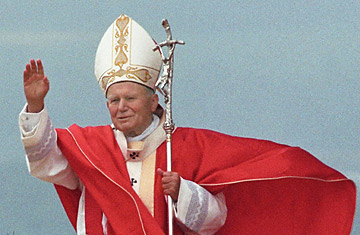
Pope John Paul II waves to a crowd in Gniezno, Poland, during a visit to his native country in 1997
(6 of 8)
Where ethnic identity remains strong and is fiercely perpetuated, the logic of the blood feud reigns, and it is infinitely harder to forgive or even think of forgiving. An old wrong, a kind of primal atrocity, sits in the tribal memory like a totem, an eternal reminder. For a man to forgive his enemy would mean betraying his father and grandfather and great-grandfather, dishonoring the sacrifices that they had made. It is treason to forgive, inexcusable to forget. So, between Armenians and Turks, Northern Irish Catholics and Protestants, between South Moluccans and Dutch, between Lebanese Maronites and Druze, between Hatfields and McCoys, between Montagues and Capulets, the ancient fury persists. The enemy is timeless. His very existence is unforgivable, but also indispensable.
Not all enmities are unreasonable, either. Timing obviously has much to do with whether or not forgiveness makes any sense. The deed, the source of the grievance, must be some time in the past, and the threat of further injury removed. If someone had taken a shot at a man and then ducked into the woods, still carrying a loaded gun, it would not be reasonable for the man to call after his assailant, "That's O.K.! I forgive you!"
Moreover, in all but the saintliest circles, forgiveness may be a luxury that depends upon a certain surrounding stability. It is more difficult to forgive when there is no protection against a recurrence, when there are no doors or windows on the house and one is at the mercy of every zealot and loon who cares to crawl in with a knife in his teeth. That is the barbarous condition of Beirut at the moment, a place that forgiveness deserted long ago.
There are in Catholic theology "the sins against the Holy Spirit." These include such offenses as despairing of salvation and obstinacy in sinning. As long as they persist, they are in some sense unforgivable. The doctrine raises interesting questions of unforgivability. If it had been 6 million Catholics who were exterminated in the Nazi death camps, would the Pope have forgiven Adolf Eichmann? Or would he have had Eichmann hunted down, taken to Rome for trial and executed, as the Jews brought Eichmann to Jerusalem for judgment and hanging?
The theme of the unforgivable offense reverberates up and down the 20th century, perhaps because such a crime is thought to be more against man—or more accurately, more against the tribe—than against God. Harold R. Isaacs, a journalist and political scientist, observed in his 1975 book Idols of the Tribe: "We are experiencing on a massively universal scale a convulsive ingathering of people in their numberless grouping of kinds—tribal, racial, linguistic, religious, national. It is a great clustering into separatenesses that will, it is thought, improve, assure, or extend each group's power or place, or keep it safe or safer from the power, threat, or hostility of others." But such fragmentation does not open people up through the offices of tolerance and forgiveness; instead it closes them in upon themselves and promotes the logic of revenge.
